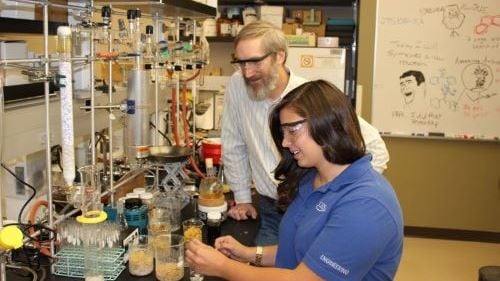Research Interest

Research Interests of Dr. Brian L. Groh
Organic Chemistry
I find “anything organic” interesting. Consequently, I have many interests in organic chemistry research that I pursue.
Organometallic Chemistry
Most fundamental is my interest in organometallic-mediated reactions in organic synthesis. One is in the area of organometallic chemistry and synthetic methodology, including new methods for the preparation of organometallic reagents and new synthetic methods that utilize organometallic compounds. I have been studying synthetic applications of organoaluminum, organozirconium, organosilver, and 1,1-heterobimetallic reagents as well as the transmetallation reactions of their organic groups with electrophiles such as tin and silicon.
In particular, we have investigated the transmetallation of vinyl zirconium compounds with tin to stereospecifically from vinyl organotin compounds. Additionally, we have found organotin compounds to transmetallate with silver to form a stereospecific homocoupled diene formed, through the decomposition of the presumed organosilver intermediate, in very good yields.
Undergraduate Laboratory Experiment Development
Another, but more applied research topic of interest is the development of new organic chemistry experiments to perform in organic chemistry I and II labs which are environmentally more sustainable in accordance with the principles of green chemistry. This process involves several approaches. The simplest is to substitute a current solvent or reagent for a greener one. This does not always work and may lead to unforeseen changes in the chemistry of the reactions. Alternatively and more interesting is the challenge to develop truly new experiments based upon the use of new, greener reactions or reagents and solvents found in the chemical literature. This can be very thought-provoking due to the need to complete experiments on the scale, in the degree of technical difficulty and timeframe of organic chemistry labs. Consideration must be given to reagent safety, cost, time limits, and difficulty level of the experiment and concepts when designing new experiments. We have developed an SN2 synthesis of 1-chlorotetradecane from 1-tetradecanol in very good yields and in high purity without the use of solvent! Additionally, we have developed the catalytic oxidation of cyclohexanone to adipic acid using hydrogen peroxide and a tungsten catalyst which has reduced the waste in the experiment, formerly accomplished using potassium permanganate, by over 99.99%!
Oilseed Chemistry and Beyond
Over the past decade-plus, I have also worked with local industries to solve product issues that arise in manufacturing or to develop new sustainable products. One major area of work has been with oil seed oils such as corn oil and soy oil. The modification of soy oil, also known generically as vegetable oil, has been challenging and rewarding. We have tackled projects with the goal of finding more sustainable ways to make existing products and new products.
Additionally, we have looked into developing methods of analysis of raw organic materials and the identification of contaminants for local industries. Puzzles to solve and something different and challenging around every turn.
Much of this work has involved student researchers and also afforded research support and internships for students.
The Chemistry of Beer – Really!
Recently, a sabbatical year afforded me the opportunity to begin studying, much to my liking, the chemistry of beer. In particular the analysis of hops and hop oil extracts. The organic molecules in hops are the components that give beer its amazingly varied aroma and bitter flavors. The chemistry of beer making is quite complex and can offer some fun challenges when trying to understand the chemistry especially when looking at problems that occur and can result in spoiling an entire batch of beer. We have looked into hop extracts and hop analysis when following the infusion of over 100 organic compounds into a batch of beer from hops! We have been able to follow the hopping process and determine the minimal, optimal, and maximum length of hopping to produce a quality beer. This has also led us to the analysis of other beer quality parameters using Standard Methods set forth by the American Society of Brewing Chemists.
Considering all the opportunities from conducting fundamental research to the challenges of brewing great beer it is clearly apparent to me why I enjoy organic chemistry so much. So many challenges, so much fun, and so little time! I’ll have another, thank you.

